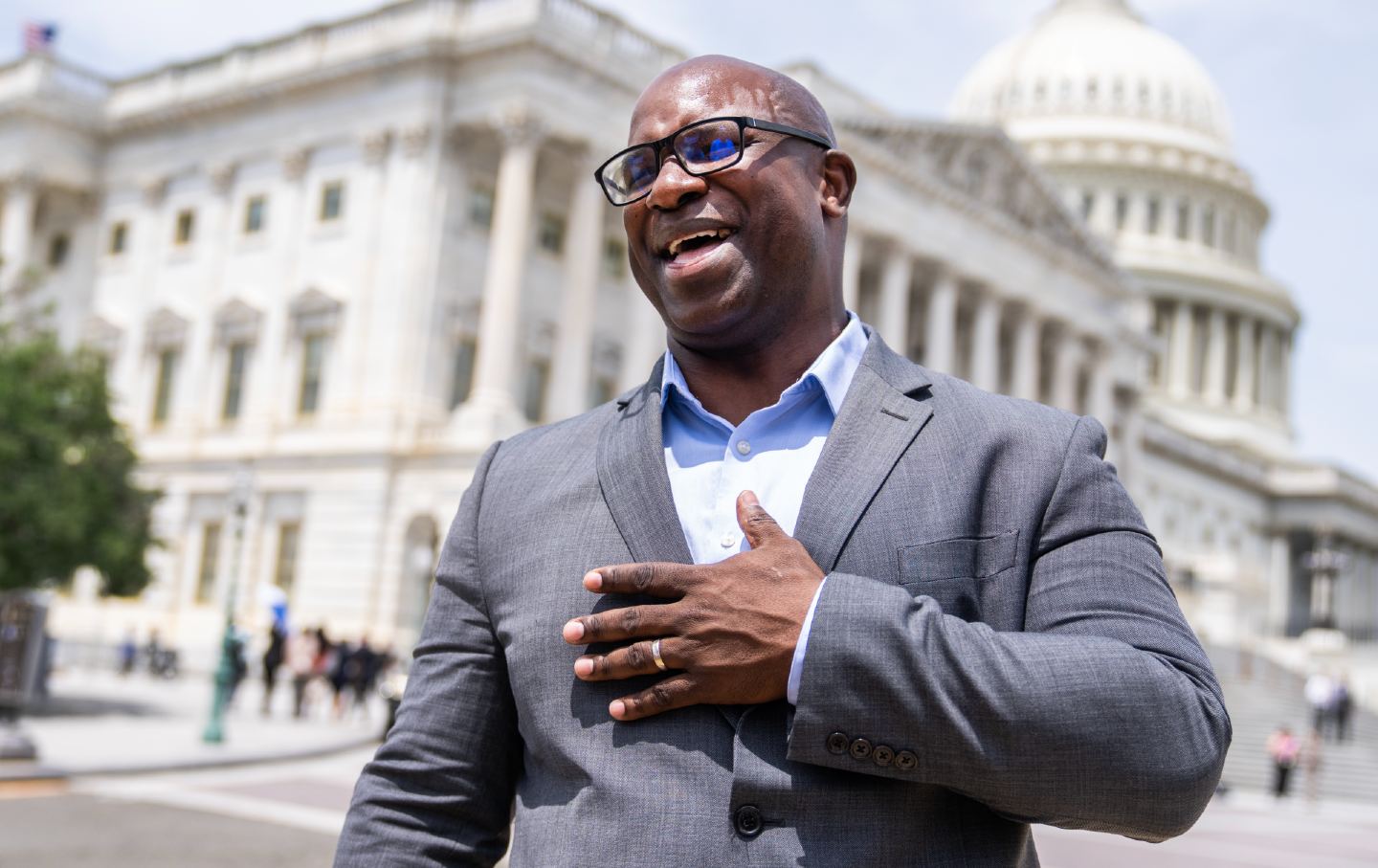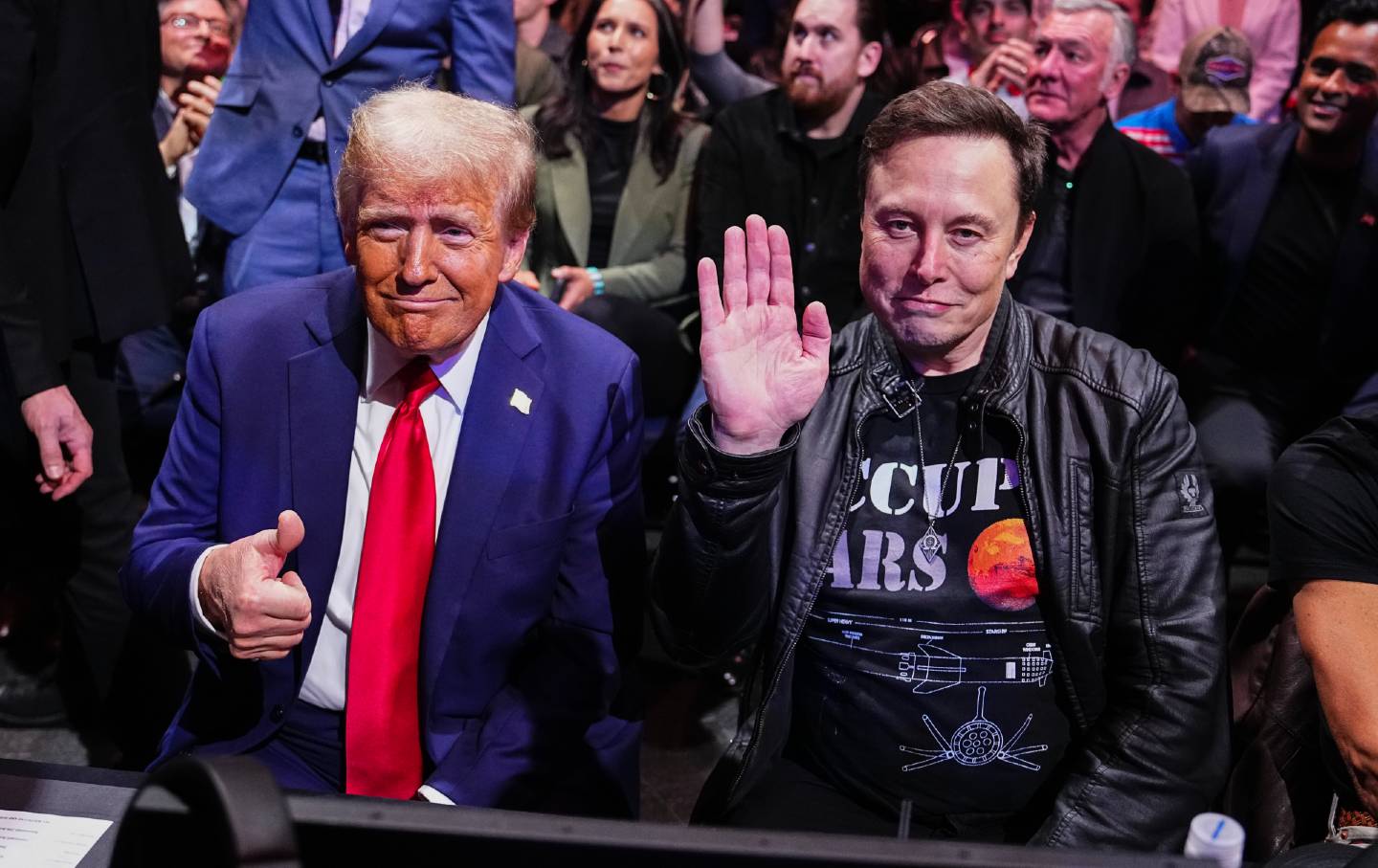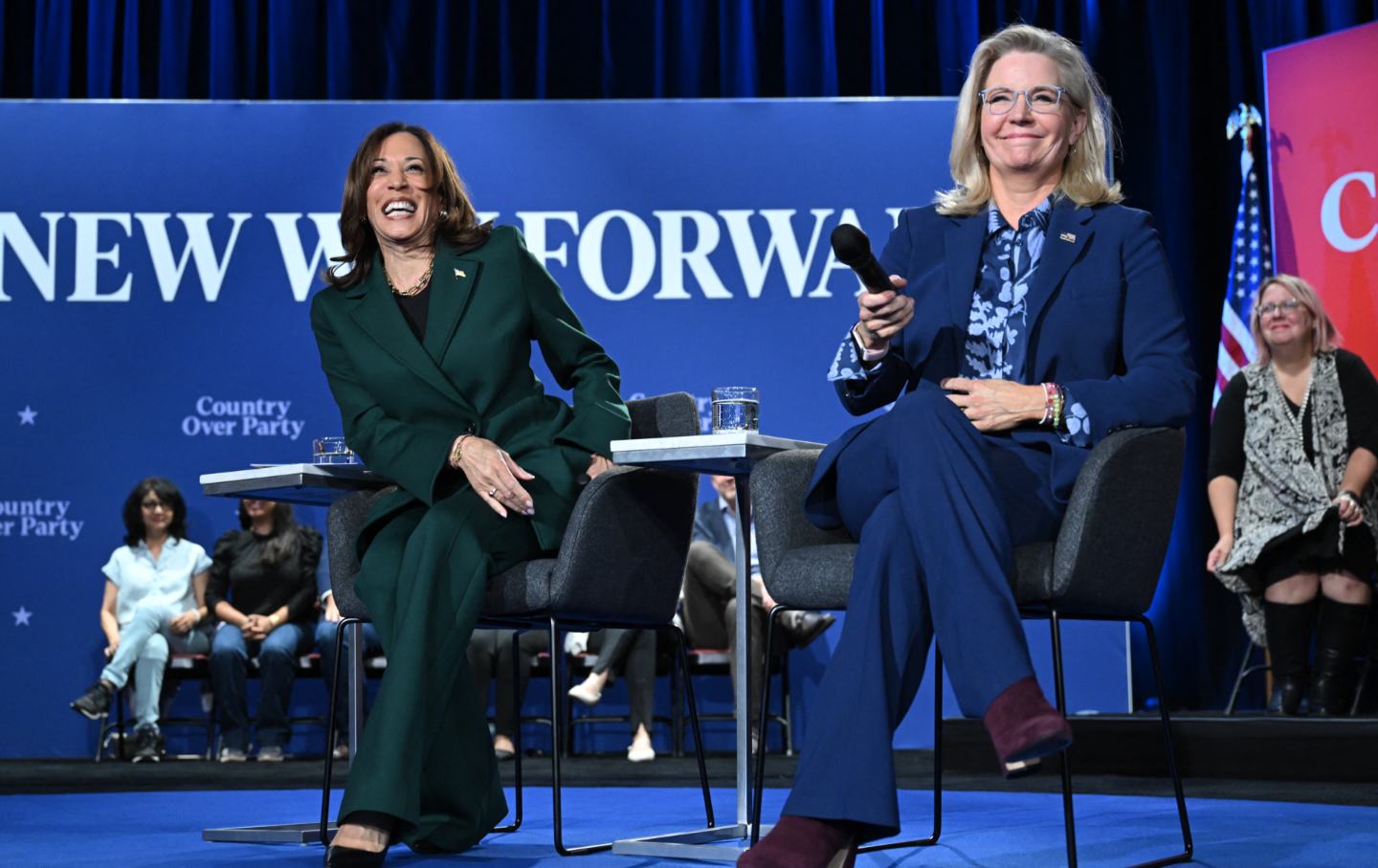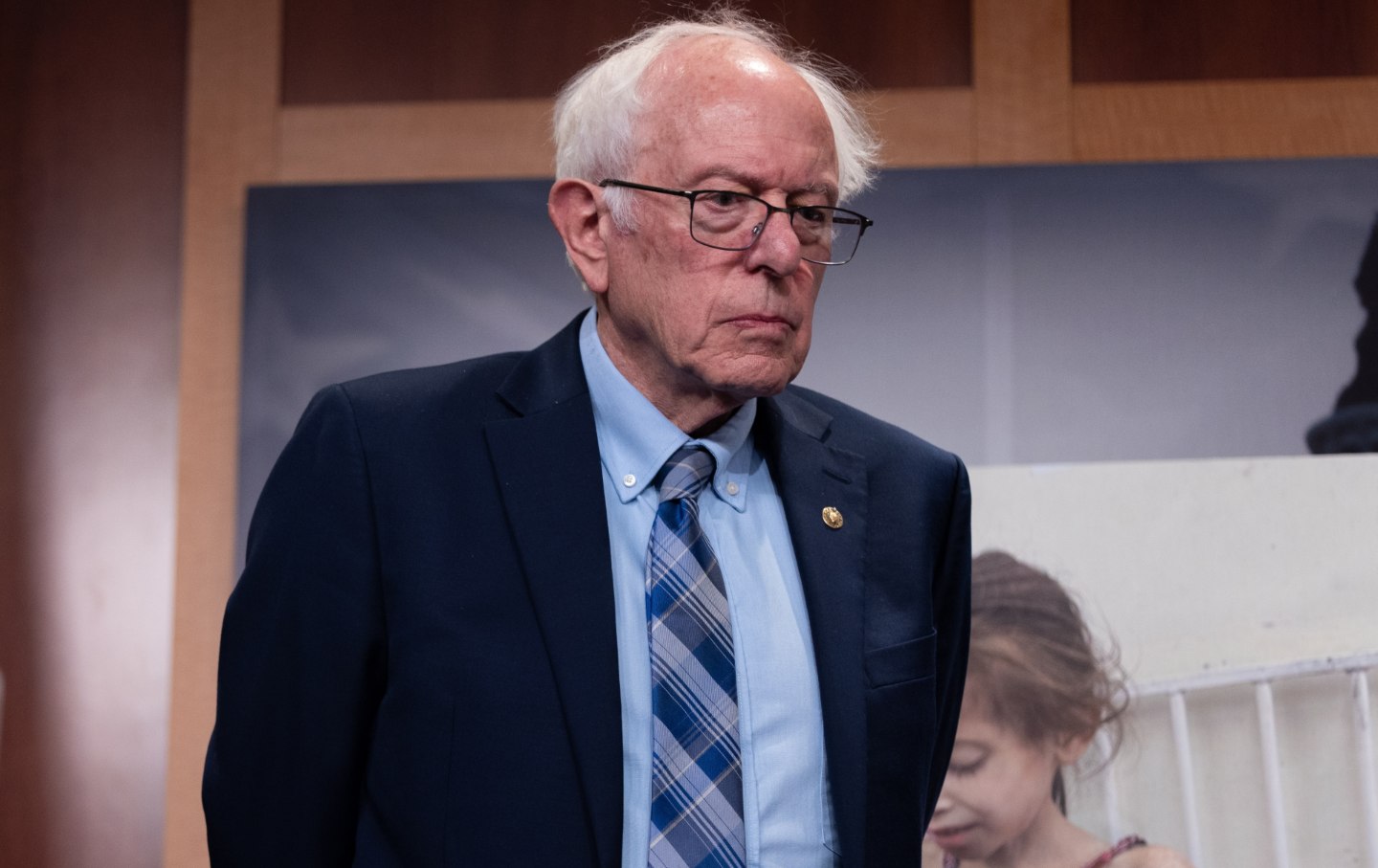Why So Much Depends Upon Jamaal Bowman Beating AIPAC
The pro-Israel lobbying group is spending millions to oust the New York congressman, but Bowman has “people power.”

Representative Jamaal Bowman is seen outside the US Capitol after a news conference to support free speech on college campuses on May 23, 2024.
(Tom Williams / CQ-Roll Call, Inc via Getty Images)
Representative Jamaal Bowman is a hugger, a high-fiver, and a beloved member of the Squad on Capitol Hill. He’s also engaged in a fight for his political life, as the American Israel Public Affairs Committee (AIPAC) has vowed to make an example of him, spending millions of dollars, sometimes in a single day, to drown him out with unrelenting attack ads.
Bowman is seeking his third term representing New York’s 16th Congressional District, which encompasses a mix of working-class cities and wealthy suburbs in Westchester County and the northern end of the Bronx. Facing a primary opponent funded by a seemingly bottomless well of dollars from AIPAC, he told me, “I’m just kind of overwhelmed with love and support and strength.”
I met with Bowman at a Jews for Jamaal canvassing of Hastings-on-Hudson on the first weekend of June. About a hundred supporters gathered at MacEachron Park for bagels and cream cheese, listened to constituents and organizers speak about the importance of the campaign, and collectively recited the Jewish Shehecheyanu blessing, which expresses gratitude and celebrates life. We then heard from the congressman himself before pounding the streets with campaign material.
Bowman, who was a teacher and a principal for 20 years before his first run for office in 2019, announced to the crowd, “I’m bringing my principal energy. I love you all! And I love parks! And I love circles!” He proceeded to bring everyone out to form a giant circle. “I just have the impulse to give everyone a high five right now,” he said before running around the circle, slapping everyone’s hands. Returning to the start of the circle, sweating in his pink button-down shirt, he paused and said, “Now I have the impulse to give everyone a low five,” and crouched down to slap everyone’s hands as he rounded the circle again.
Once the hand-slapping was done, Bowman talked to canvassers about the importance of “staying rooted in the politics of love,” where every life is sacred, and everyone’s safety and security is the goal. “Whoever you encounter,” he told his supporters, “whether they agree or disagree or hate my guts, engage them with your humanity and with your love for them.”
After the canvassers had taken off on their routes, I sat with the congressman on a park bench overlooking the Hudson River. He described the communities, organizations, and individuals who have shown up to support his campaign, knocking on about 100,000 doors, making almost half a million phone calls, and raising over $2.5 million. “We don’t have as many as ads as they do,” he said, “but we don’t need to. Because our message is much more human.”
But no matter Bowman’s message, he is AIPAC’s number-one target. The lobbying group is one of Washington’s most powerful, and it has vowed to spend $100 million to defeat members of the Squad for their opposition to Israel’s war on Gaza. AIPAC handpicked, courted for months, and funded Westchester County Executive George Latimer, a multimillionaire, who only recently filed his financial disclosure showing, among other assets, three residencies.
Bowman, the first Black man to hold his seat, grew up with a single mom and lived in public housing. “I was raised,” he told me, “in a crack cocaine epidemic. My sister was addicted—it was very hard on our family. To come from that to be the first to graduate from college in my family, to being an educator and opening my own school to having the audacity to run for Congress against a 31-year incumbent and provide the kind of hope and inspiration that all Americans need, and especially Black boys, that’s what I’m most proud of.”
But the battle in Westchester and the northern Bronx is not simply one of working-class underdog versus a well-funded machine. Nor is it only an election with racialized undertones, though Latimer’s campaign has tugged on some familiar anti-Black and anti-Muslim fears. If Bowman loses his seat during the June 25 primary, it will be a significant setback to the movement on Capitol Hill for a cease-fire in Gaza, and pose an existential threat to the small but growing project for left political power.
The election tests the strength of organizations like the Justice Democrats, Working Families Party, and Democratic Socialists of America (DSA), all of whom have helped elect left Democrats to Congress. Because these groups draw upon the support of people of color and the working class, they will never be able to out-fundraise the likes of AIPAC. Their strength is their “people power”—volunteers by the hundreds or thousands hitting the phones and the streets—and the appeal of politics like Medicare for All, universal childcare, and free college tuition that challenge the status quo. But if the status quo can come back to squash the left’s most vocal representatives, it will call into question the strategy of activating a previously overlooked and disaffected base. The Squad has been able to provide lightning rods in Congress around which other progressives can rally—helping to bring, for instance, the number of legislators who have come out for cease-fire to over 60. But if AIPAC wins in the 16th district, it may silence “Squad-adjacent” legislators with the threat of drawing the lobby’s ire, and therefore isolate the Democratic left.
Israel on the Ballot?
The call for a cease-fire in Gaza, championed by Bowman and other progressives in Congress, is popular among nearly every constituency—including 80 percent of Democrats. Witnessing the destruction of life in Gaza for eight unrelenting months has transformed public opinion. Lefty legislators like Bowman, Cori Bush, and Rashida Tlaib have helped to crystalize those shifts, by putting forward a cease-fire resolution and showing up to support hunger strikes, vigils, and student encampments.
For the first time, sympathy to the Palestinian cause is being reflected in official politics, prying open a discussion that had been taboo for decades. “What we’ve heard throughout our lifetime,” Bowman explained to me, “is that Israel has a right to exist and a right to defend itself, over and over and over. And OK, I agree with those things. But there are other people there! They’re called Palestinians. Is someone going to speak with any humanity and dignity about the Palestinians in this equation? You didn’t hear it before. Now you hear it, right? That’s vital.”
Although AIPAC has a long and all-too-successful history of punishing critics of Israel, it was in 2021 that the lobby began spending directly on elections. Its decision to do so came just months after a vicious and unpopular assault on Gaza, and an unprecedented move by progressives to criticize Israel on the house floor, calling out the reality of occupation, ethnic cleansing, and apartheid for millions to see on social media and elsewhere.
The lobbying group’s super PAC—misnamed the United Democracy Project (UDP)—has thrown down more than $2 million per week to flood the district with campaign attack ads. One constituent told me that pro-Latimer and anti-Bowman ads funded by UDP come up once or twice in every commercial break. As of June 7 their total spending on District 16’s primary race is well over $10 million, a record for a congressional primary, and much more than what Bowman and Latimer have raised combined.
Popular
“swipe left below to view more authors”Swipe →Super PACs like UDP are considered “independent expenditures,” meaning that they are ostensibly outside the purview of official campaigns and can therefore spend unlimited amounts of money on elections. As Branko Marcetic reported, the UDP’s coffers are filled via mostly corporate, right-wing donors.
AIPAC also pooled more than $600,000 directly to the campaign itself, according to the campaign’s last FEC filing on March 31. (This number is likely a severe undercount, as it doesn’t include money fundraised by AIPAC allies and contributed through other platforms.) Among AIPAC’s haul are significant Republican contributions. And it has worked with organizations like Westchester Unites to encourage Republicans to switch parties to vote in the Democratic primary. Meanwhile, the National Black Empowerment Fund, which was formed by AIPAC alums and proudly partnered with disgraced former Governor Andrew Cuomo to “challenge woke progressives,” has also jumped into the fray.
The politics of Israel and Palestine is a potentially polarizing topic in Bowman’s district, which includes wealthy suburbs and a Jewish population that makes up about 10 percent of the district’s households. Mondaire Jones, a former House Representative and onetime political ally, endorsed Latimer on June 4, saying he made his decision “to stand up for my Jewish constituents, because Representative Bowman and I have very different views on Israel.” Meanwhile, the liberal, pro-Israel J-Street has also rescinded its endorsement of Bowman, saying that he “crossed a line” by referring to Israel’s actions as genocide.
Yet the majority of Jews in the US (52 percent, according to a May survey by the Jerusalem Center for Public Affairs) believe that the United States should withhold arms from Israel, and 30 percent of Jews polled said they believe Israel is engaging in genocide. At canvasses and phone banks in the suburban neighborhoods of District 16, there were some harsh words for Bowman. One man told me to “tell Bowman to go to hell.” Another Scarsdale resident said that she’s supporting Latimer, because he “is going to stand with Israel, and support Israel, and Bowman has proven to be the opposite.” But for every disparaging remark, there were several more in support of the representative, including within suburban towns. At Dobb’s Ferry, an older white man wearily opened the door to canvassers, but then smiled when he heard Bowman’s name. “Oh Bowman? Yeah, I’m planning to vote for him.”
In the working-class neighborhoods where primarily people of color live—the northern Bronx, New Rochelle, Mount Vernon, and Yonkers—Bowman is expected to win handily. At a Muslims for Jamaal canvassing in Yonkers (this time featuring kebabs rather than bagels), supporters reported nearly unanimous support. Residents offered water and invited canvassers into their homes.
But the reality is that AIPAC’s forceful entry into the race puts Bowman’s seat in danger. A poll released Tuesday found Latimer leading Bowman by 17 points.
The mainstream media has chimed in, painting Bowman’s endorsement by DSA as evidence that the congressman has opportunistically changed course on his politics in order to placate a “small but influential group,” in the words of The New York Times, or “extremists” according to Latimer. Bowman had previously been criticized by DSA members because of his vote to support increased funding for Israel’s Iron Dome missile defense system in 2021, and a visit to Israel sponsored by J-Street that same year. Framing his new course as one of “balancing conflicting interests” rather than a genuine change of position amid Israeli war crimes, the reporting implied a dishonest approach.
But Bowman told me that at the time he felt no conflict voting in favor of Iron Dome funding. He said he considered it defensive in nature: “I believe everyone has a right to defend themselves. And I didn’t want to communicate to the Jewish people in my district that I’m OK with there not being an Iron Dome, theoretically, and Israelis being hurt by missiles.”
But he added, “Since then, I’ve gone to the West Bank. I visited Ramallah, Hebron. I met with kids, scholars, with former IDF soldiers. And my takeaway was we were lying about supporting a two-state solution.… There are several hundreds of thousands of settlers in what supposed to be a Palestinian state. We’ve allowed that to happen without any consequence.” After October 7, he condemned Hamas as well as the mass collective punishment of Palestinians by the Israeli government. “So there’s no way that I can vote for any weapons and military assistance to Israel in this moment,” he said. “Or ever, if we don’t get to a Palestine state.”
The election, however, is more likely to be a test of AIPAC’s power, than a referendum on Israel and Palestine. AIPAC’s ads rarely mention Israel at all. Instead, they try to paint Bowman as an out-of-touch radical who has not adequately fought for his district. This is the same approach the lobby has taken to all of the Democratic primaries into which it has waded. Knowing how unpopular the war in Gaza is, AIPAC strategists have reasoned that those that oppose a cease-fire will already know to vote against Bowman. Everyone else is more likely to be convinced on issues that they perceive are bread-and-butter than on a deeply unpopular war.
Latimer’s campaign has touted him as the more “rational” politician, and highlighted any perceived missteps—such as an incident last fall when Bowman set off a false fire alarm in the Cannon House when the Democrats were stalling for time to review a Republican spending bill. Bowman received a formal rebuke by the Republican-led House for doing so, and even centrist Democrats called the punishment of a trivial matter “profoundly stupid.” Yet, in the context of mobilizing the upper-middle-class white suburbs of District 16, the scandal—along with a decade-old blog post flirting with 9/11 conspiracy theories—has been brought back in a thinly veiled, racist portrayal of Bowman as an outsider, not well-suited for the upper echelons of political society.
Along similar lines, Latimer seemed to be stoking Islamophobia and anti-Arab racism in the candidates’ most recent debate. There, Latimer accused Bowman of relying on outsider support beyond District 16. “Your constituency is Dearborn, Michigan,” he said, referencing the city with the largest Arab population per capita. The racist overtones are obvious, according to Jewish political analyst Peter Beinart: “It’s like saying someone’s constituency is Borough Park. Not even subtle.”
Real and Aspirational
In George Latimer, AIPAC found a career, centrist Democrat, willing to ally with conservatives and Republicans against the left of the Democratic Party. He has held local offices for decades, combining general support for liberal social causes like gay rights and electrifying the bus fleet with nods to “fiscal responsibility,” and cuts to property taxes. He told a Westchester newspaper that he would not reverse Trump’s tax cuts on the wealthy. The matchup has exposed a long-standing clash between the party’s left and right. As one pro-Israel Democratic consultant recently told Politico, “It’s about the DSA versus what we can call the regular Democratic Party. It’s about pro-cop versus anti-law enforcement. It’s about the far left versus the deep center.”
The AIPAC-funded ads attacking Bowman use his vote against the bipartisan infrastructure bill in 2021 as proof that he puts rhetoric ahead of results. Bowman was among six left Democrats who balked at voting for the Bipartisan Infrastructure Framework (BIF) separately from the Build Back Better (BBB) reconciliation package. Democratic Party leaders had in fact promised for months that they would pass the former only if the latter simultaneously came to a vote. President Joe Biden had said: “If this is the only one that comes to me, I’m not signing it. It’s in tandem.” Ultimately, the party leadership changed its mind, and in doing so, lost bargaining power over moderate Democrats to pass BBB, which was eventually allowed to die.
Representative Bowman argues that the significant victories that did eventually come through the Inflation Reduction Act, a scaled-back version of BBB, are in large part the result of the kind of pushing and pressuring that he and other left Democrats made in Congress. As vice chair of the House’s education and labor committee, he also worked closely on the American Rescue Plan, and fought to ensure that the “bill was rooted in equity.” Indeed, most of the benefits of the bill went to the poor and working class, providing critical economic supports to tens of millions of people, including much of Bowman’s own district. His North Star, he explained, is, “How are the children? Are the kids OK? If they’re not OK, then we have to stop everything.” Whether, he continued, that’s “the 14-year-old kid shot and killed in Mount Vernon, or the burned-alive baby in Gaza, or the children killed on October 7, they’re the same to me.”
It’s that same principal energy that he’s brought to his job on Capitol Hill. The first time I met the congressman was at a hunger strike for cease-fire outside the White House last November. Bowman was brought to tears at the reading of the names of children killed in Gaza. When the press conference ended, a mother with her young child approached him to say that she is a resident of his district and a proud supporter. Bowman picked up her child in his arms and told him, “If you ever need anything, you tell me.”
Months later, speaking to Bronx resident Patricia Njoku, I understood that Bowman meant what he said. Njoku’s son, recently graduated from high school in 2021, had gone missing. He had been a student at the Cornerstone Academy for Social Action (CASA), a public middle school founded and led by Bowman in the years before he ran for public office. All of her children attended CASA, Njoku told me, and loved going to school because they connected so much with their principal. So much so, she told me, that they insisted on getting to school on time to hear Principal Bowman’s morning meetings. “He treats them like his own children.”
In 2021, Bowman had just entered into office when the family informed him that their son had disappeared. “Mr. Bowman took it upon himself,” she told me, calling around Congress to help track down her son, utilizing local police departments in the search. She said he told other members of Congress “that this boy was his student, that he’s a good boy, and he can’t afford to lose this boy.… He never stopped until he was found.”
It wasn’t just Njoku’s son. “There was a lot going on” at that time, Bowman explained. With Covid-19 raging, young people were depressed, alienated, and had gone back to school with few supports. “Julian, shot by another teenager. Kayla in Mt. Vernon, stabbed to death by another girl. A child in Rye died by suicide,” Bowman recounted. He met with students, parents, teachers, and administrators at schools throughout his district to try to understand the causes of the violence and what was needed to address it. He worked with schools and community groups to access Community Project Funding and brought in more than $10 million to counter gun violence with programs that target at-risk youth with mentorships, mental health, and substance abuse supports. He also successfully advocated for an executive action to ban “ghost guns,” which are assembled out of kits, like the one that was used to kill Julian.
More on Jamaal Bowman
But as Bowman puts it, while these types of resources are significant to those that receive them, it’s not nearly enough. On his agenda is $14 trillion worth of spending for universal healthcare and childcare, a Green New Deal, and reparations to Black Americans. He is advocating for universal childcare through a Babies Over Billionaires bill that would tax the stocks and capital assets of ultra-millionaires to fund universal childcare, pre-K, 3-K, and reduced class sizes. Bowman’s TikTok video where he explains why he introduced the bill gives some indication of why conservative and establishment politicians have united behind AIPAC’s attack. Walking down the street with the video in selfie mode, he says, “We need to make sure billionaires in our country, oligarchs in our country, contribute to the democracy that they take advantage of to make billions in profits every single year while the rest of the American people suffer.”
Bills like Babies Over Billionaires may not pass anytime soon. But the political strategy employed by Bowman and other members of the Squad is to be both “real and aspirational,” as Bowman put it to me. Fight for what is in the realm of possibility, while also pushing the discussion to make more achievable in the future. “We have to change the political establishment,” he said, “and part of that is changing the conversation and creating new dialogue about what’s possible.” The media and the education system decide “what’s important and what isn’t. Who’s important, who isn’t. And when you get people like me in office, we have a responsibility to change that.”
We cannot back down
We now confront a second Trump presidency.
There’s not a moment to lose. We must harness our fears, our grief, and yes, our anger, to resist the dangerous policies Donald Trump will unleash on our country. We rededicate ourselves to our role as journalists and writers of principle and conscience.
Today, we also steel ourselves for the fight ahead. It will demand a fearless spirit, an informed mind, wise analysis, and humane resistance. We face the enactment of Project 2025, a far-right supreme court, political authoritarianism, increasing inequality and record homelessness, a looming climate crisis, and conflicts abroad. The Nation will expose and propose, nurture investigative reporting, and stand together as a community to keep hope and possibility alive. The Nation’s work will continue—as it has in good and not-so-good times—to develop alternative ideas and visions, to deepen our mission of truth-telling and deep reporting, and to further solidarity in a nation divided.
Armed with a remarkable 160 years of bold, independent journalism, our mandate today remains the same as when abolitionists first founded The Nation—to uphold the principles of democracy and freedom, serve as a beacon through the darkest days of resistance, and to envision and struggle for a brighter future.
The day is dark, the forces arrayed are tenacious, but as the late Nation editorial board member Toni Morrison wrote “No! This is precisely the time when artists go to work. There is no time for despair, no place for self-pity, no need for silence, no room for fear. We speak, we write, we do language. That is how civilizations heal.”
I urge you to stand with The Nation and donate today.
Onwards,
Katrina vanden Heuvel
Editorial Director and Publisher, The Nation
More from The Nation

How Loyalty Trumps Qualification in Trump Universe How Loyalty Trumps Qualification in Trump Universe
Meet “first buddy” Elon Musk.

Bury the #Resistance, Once and For All Bury the #Resistance, Once and For All
It had a bad run, and now it’s over. Let’s move on and find a new way to fight the right.

Trans People Shouldn’t Be Scapegoated for Democrats’ Failures Trans People Shouldn’t Be Scapegoated for Democrats’ Failures
Politicians and pundits are stoking a backlash to trans rights in the wake of the election. They’re playing a dangerous game.

Bernie Sanders Is Leading a Bold New Effort to Block Arms Sales to Israel Bernie Sanders Is Leading a Bold New Effort to Block Arms Sales to Israel
The senator has more allies than ever in his fight to hold Israel accountable and save lives in Gaza.

Will “Serious” Republicans Block Any of Trump’s Freak-Show Cabinet Picks? Will “Serious” Republicans Block Any of Trump’s Freak-Show Cabinet Picks?
Will they stand up to even the scariest of these nominees? I’m not optimistic.

Harris’s Gaza Policy Was a Disaster on Every Level Harris’s Gaza Policy Was a Disaster on Every Level
Palestine may not have swung the election one way or another. But Democrats unquestionably paid a high price for their refusal to hold Israel accountable.


